Thomas James Richards, Diaries, Transcript Vol. 3, 26 January to 8 November 1916 - Part 25
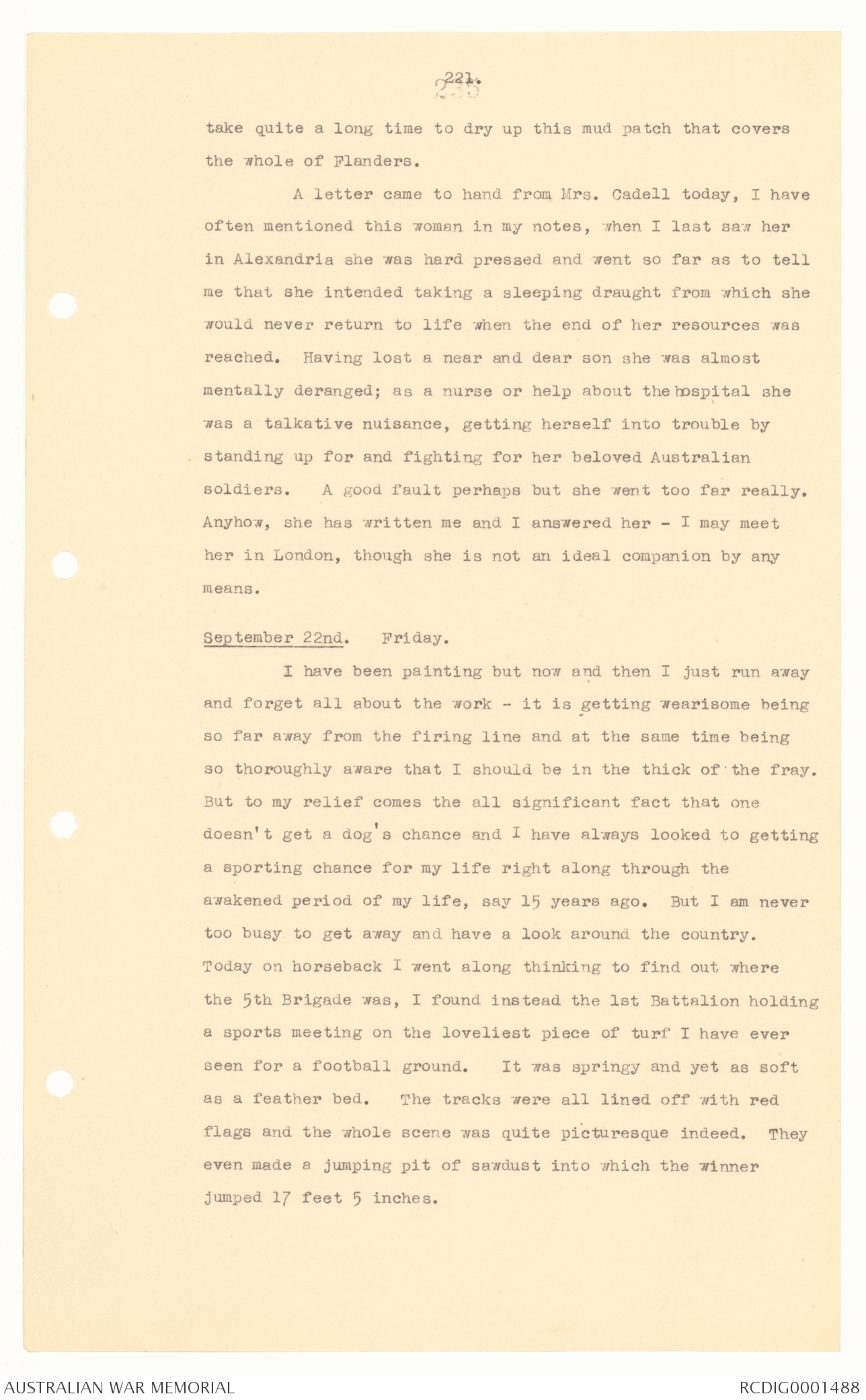
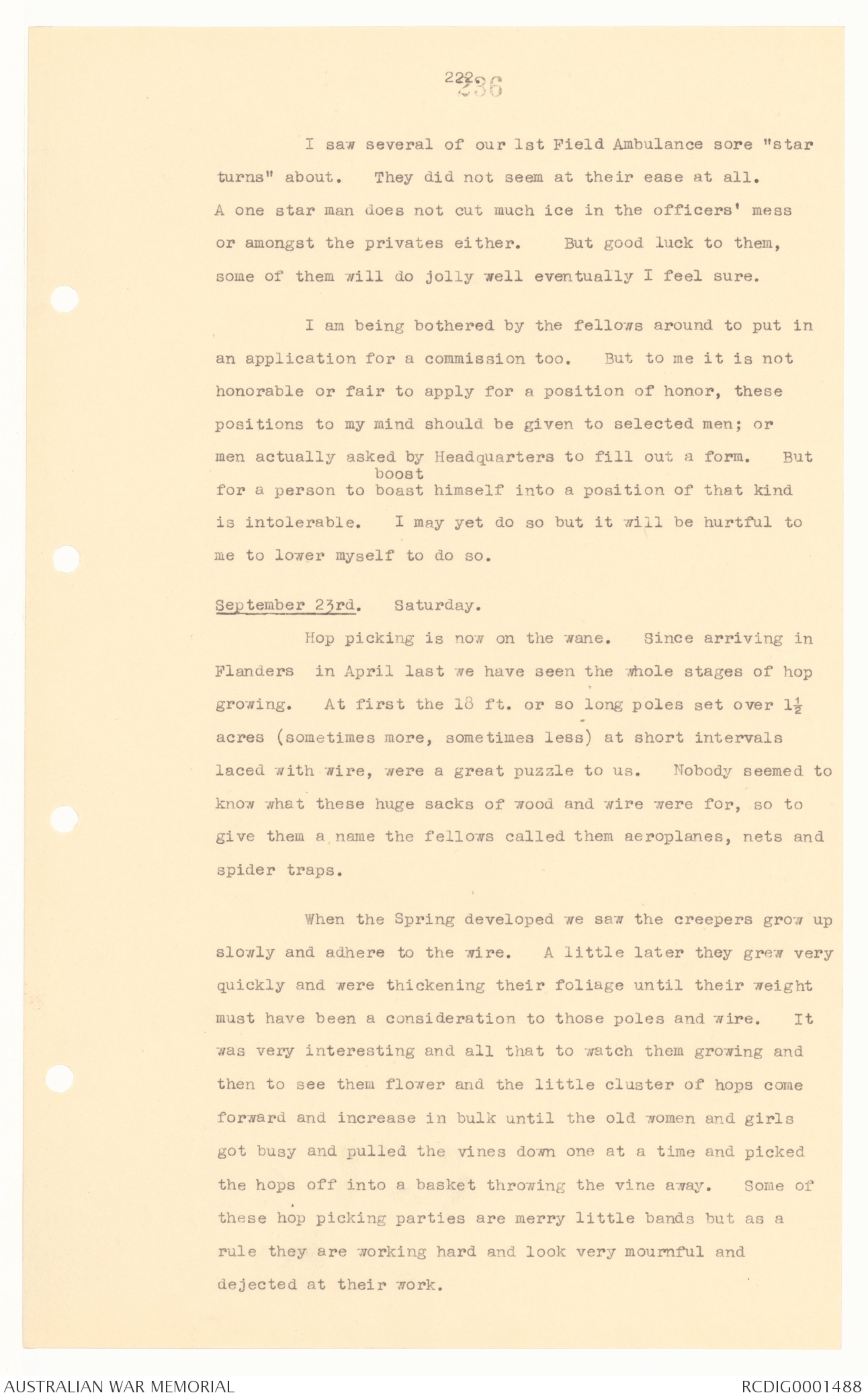
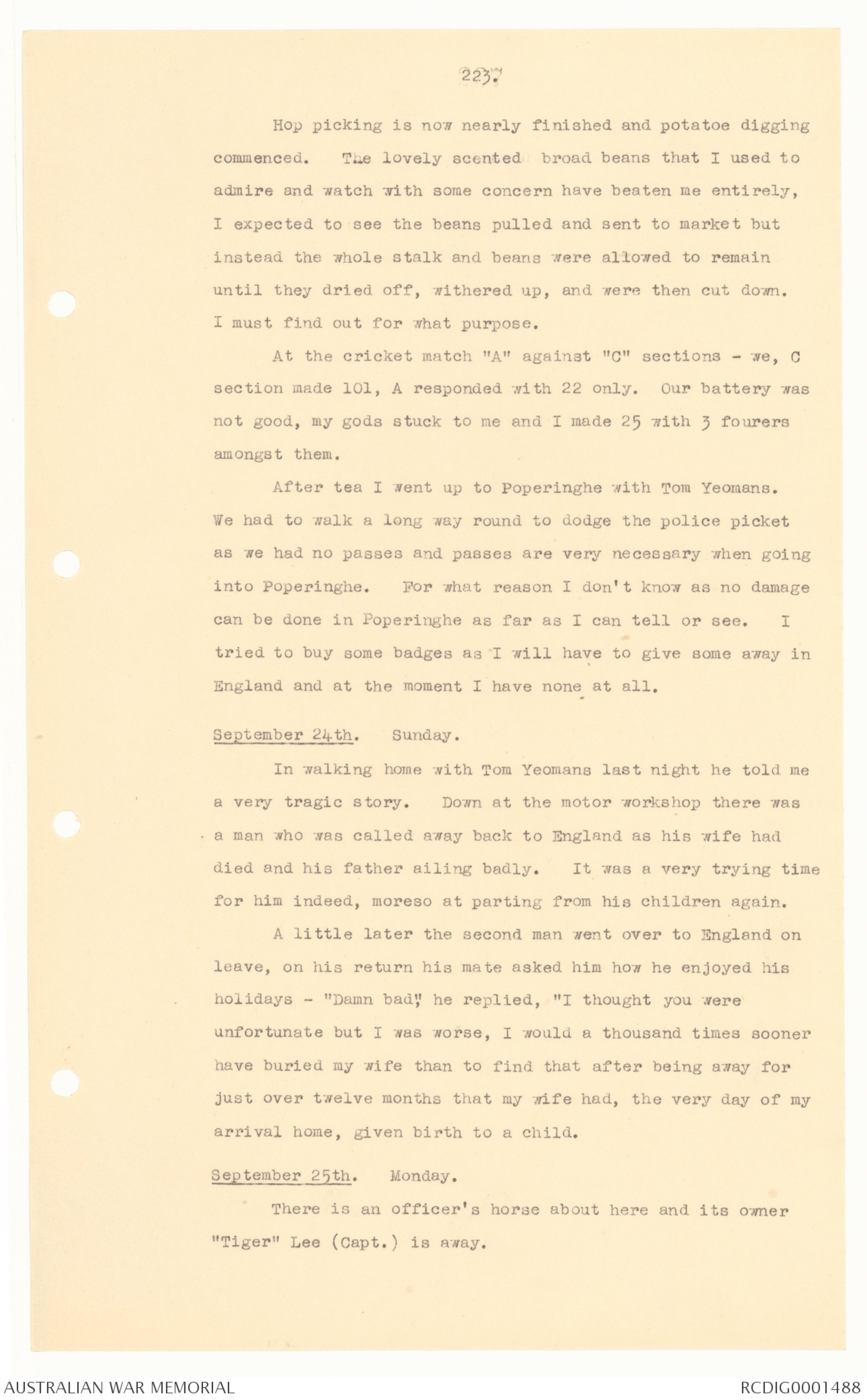
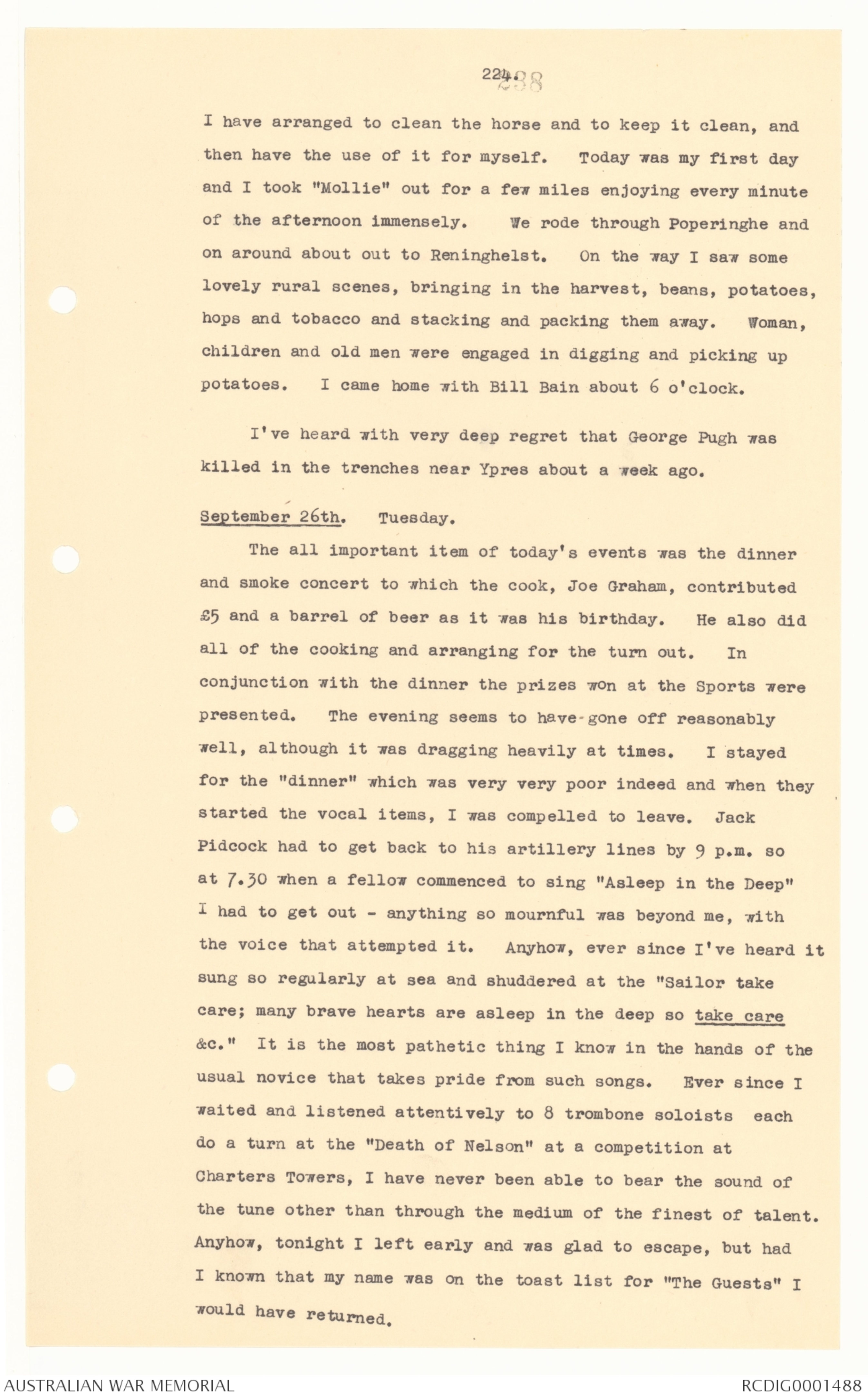
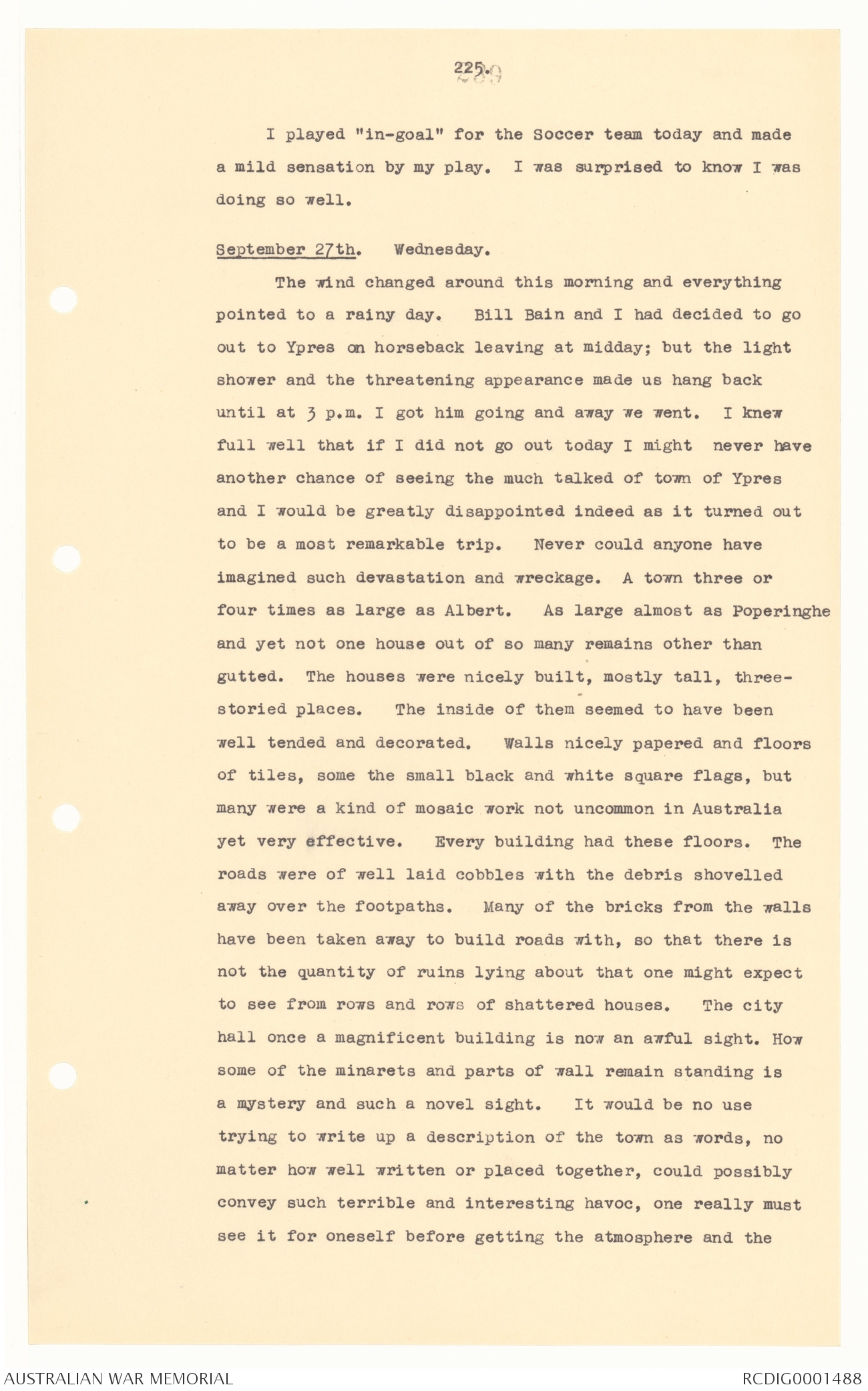
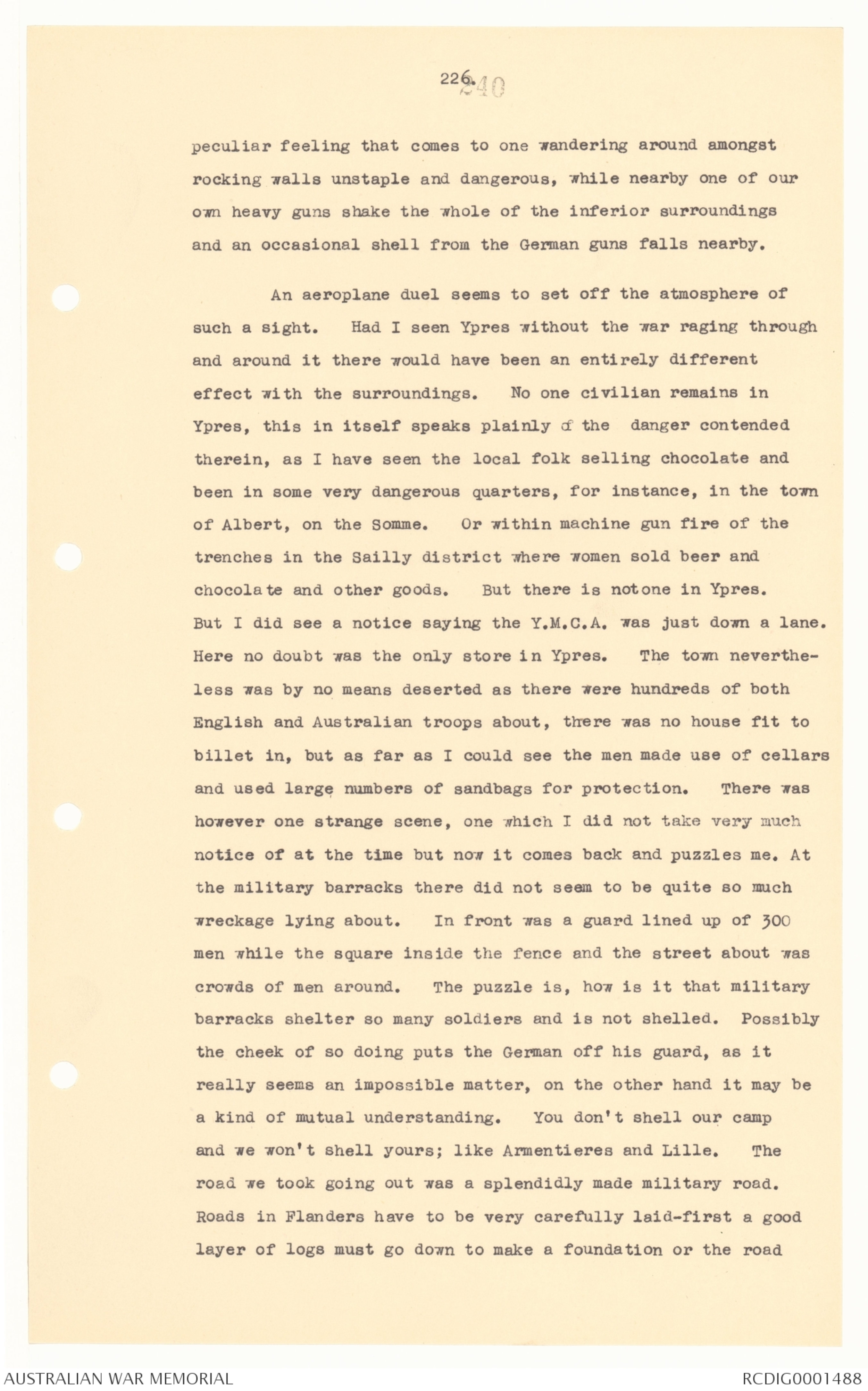
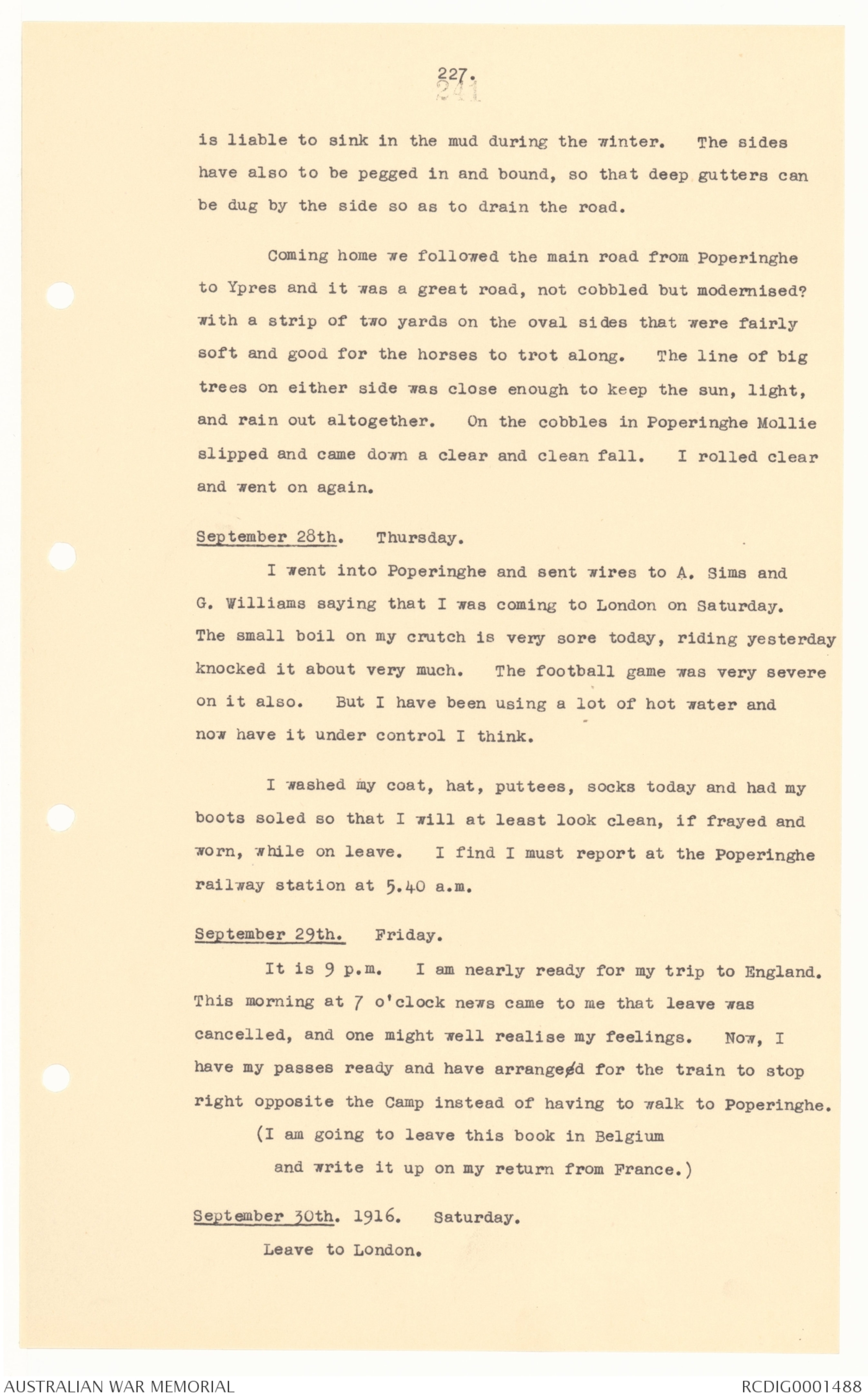
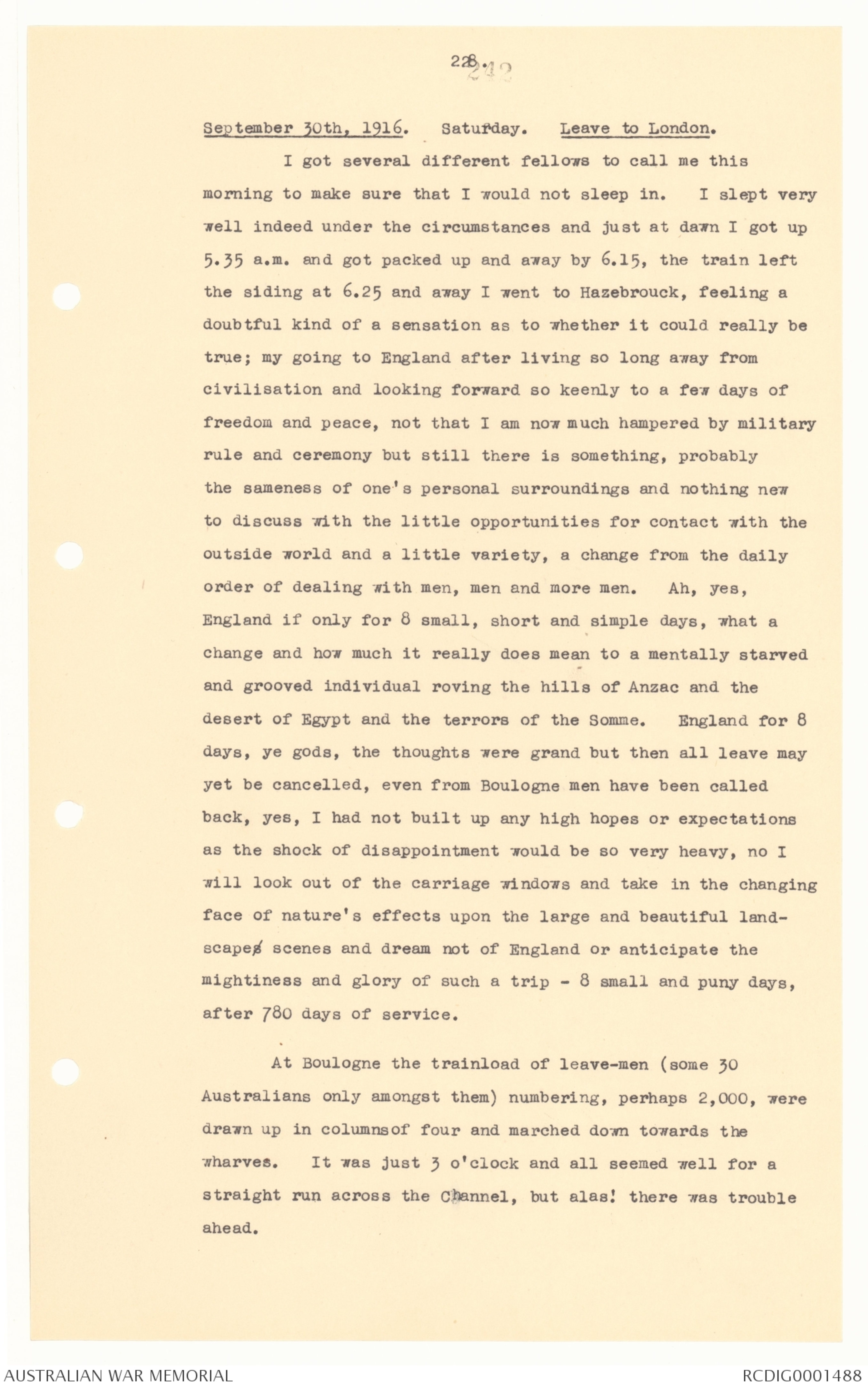
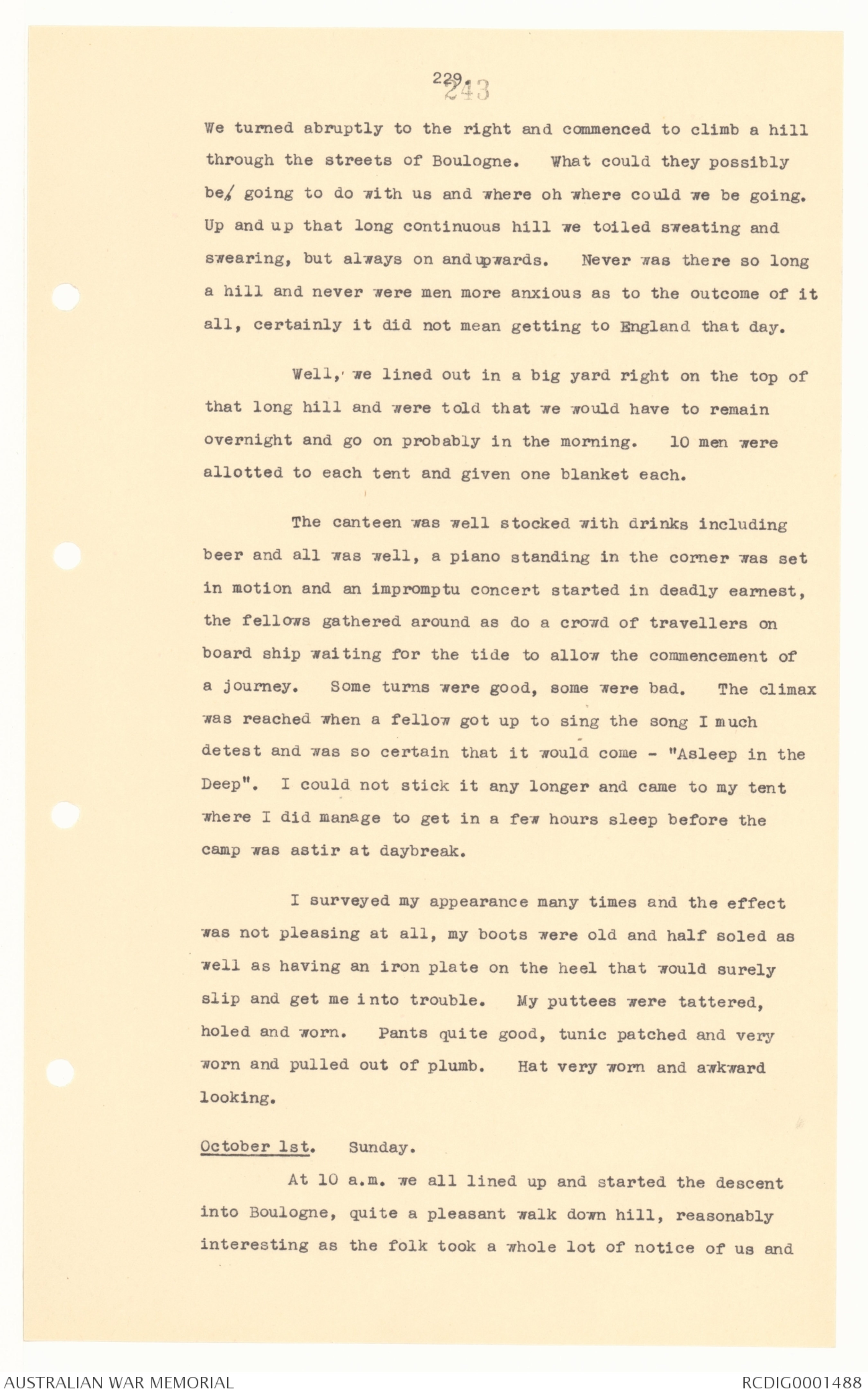
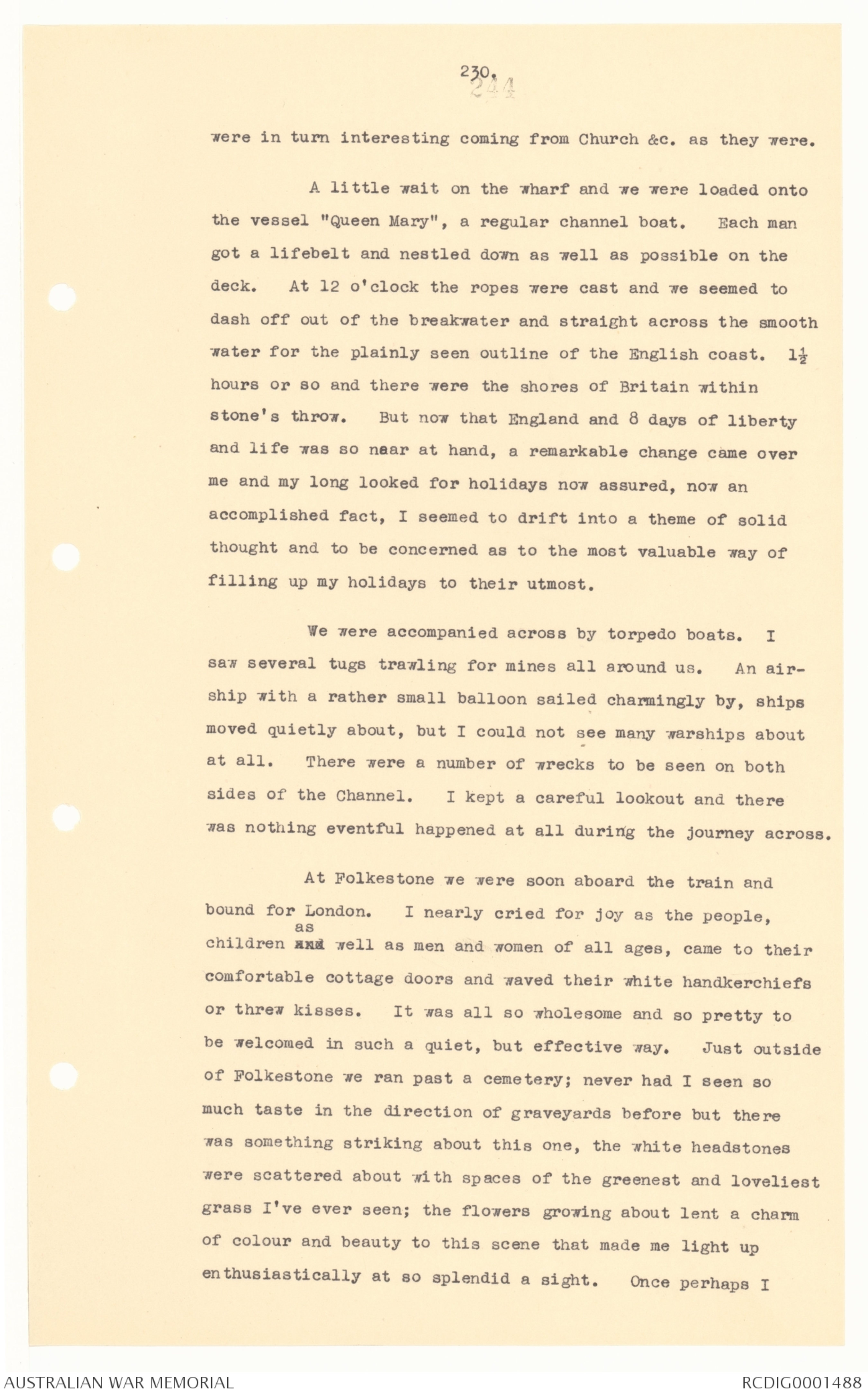
221. 235
take quite a long time to dry this mud patch that covers
the whole Flanders.
A letter came to hand from Mrs. Cadell today, I have
often mentioned this woman in my notes, when I last saw her
in Alexandria she was hard pressed and went so far as to tell
me that she intended taking a sleeping draught from which she
would never return to life when the end of her resources was
reached. Having lost a near and dear son she was almost
mentally deranged; as a nurse or help about the hospital she
was a talkative nuisance, getting herself into trouble by
standing up for and fighting for her beloved Australian
soldiers. A good fault perhaps but she went too far really.
Anyhow, she has written me and I answered her - I may meet
her in London, though she is not an ideal companion by any
means.
September 22nd. Friday.
I have been painting but now and then I just run away
and forget all about the work - it is getting wearisome being
so far away from the firing line and at the same time being
so thoroughly aware that I should be in the thick of the fray.
But to my relief comes the all significant fact that one
doesn't get a dog's chance and I have always looked to getting
a sporting chance for my life right along through the
awakened period of my life, say 15 years ago. But I am never
too busy to get away and have a look around the country.
Today on horseback I went along thinking to find out where
the 5th Brigade was, I found instead the 1st Battalion holding
a sports meeting on the loveliest piece of turf I have ever
seen for a football ground. It was springy and yet as soft
as a feather bed. The tracks were all lined off with red
flags and the whole scene was quite picturesque indeed. They
even made a jumping pit of sawdust into which the winner
jumped 17 feet 5 inches.
222 236
I saw several of our 1st Field Ambulance sore "star
turns" about. They did not seem at their ease at all.
A one star man does not cut much ice on the officers' mess
or amongst the privates either. But good luck to them,
some of them will do jolly well eventually I feel sure.
I am being bothered by the fellows around to put in
an application for a commission too. But to me it is not
honorable or fair to apply for a position of honor, these
positions to my mind should be given to selected men; or
men actually asked by Headquarters to fill out a form. But
for a person to boast boost himself into a position of that kind
is intolerable. I may yet do so but it will be hurtful to
me to lower myself to do so.
September 23rd. Saturday
Hop picking is now on the wane. Since arriving in
Flanders in April last we have seen the whole stages of hop
growing. At first the 18 ft. or so long poles set over 1½
acres (sometimes more, sometimes less) at short intervals
laced with wire, were a great puzzle to us. Nobody seemed to
know what these huge sacks of wood and wire were for, so to
give them a name the fellows called them aeroplanes, nets and
spider traps.
When the Spring developed we saw the creepers grow up
slowly and adhere to the wire. A little later they grew very
quickly and were thickening their foliage until their weight
must have been a consideration to those poles and wire. It
was very interesting and all that to watch them growing and
then to see them flower and the little cluster of hops come
forward and increase in bulk until the old women and girls
got busy and pulled the vines down one at a time and picked
the hops off into a basket throwing the vine away. Some of
these hop picking parties are merry little bands but as a
rule they are working hard and look very mournful and
dejected at their work.
223.
Hop picking is now nearly finished and potatoe digging
commenced. The lovely scented broad beans that I used to
admire and watch with some concern have beaten me entirely,
I expected to see the beans pulled and sent to market but
instead the whole stalk and beans were allowed to remain
until they dried off, withered up, and were then cut down.
I must find out for what purpose.
At the cricket match "A" against "C" sections - we, C
section made 101, A responded with 22 only. Our battery was
not good, my gods stuck to me and I made 25 with 3 fourers
amongst them.
After tea i went up to Poperinghe with Tom Yeomans.
We had to walk a long way round to dodge the police picket
as we had no passes and passes are very necessary when going
into Poperinghe. For what reason I don't know as no damage
can be done in Poperinghe as far as I can tell or see. I
tried to buy some badges as i will have to give some away in
England and at the moment I have none at all.
September 24th. Sunday.
In walking home with Tom Yeomans last night he told me
a very tragic story. Down at the motor workshop there was
a man who was called away back to England as his wife had
died and his father ailing badly. It was a very trying time
for him indeed, moreso at parting from his children again.
A little later the second man went over to England on
leave, on his return his mate asked him how he enjoyed his
holidays - "Damn bad," he replied, "I thought you were
unfortunate but I was worse, I would a thousand times sooner
have buried my wife than to find that after being away for
just over twelve months that my wife had, the very day of my
arrival home, given birth to a child.
September 25th . Monday.
There is an officer's horse about here and its owner
"Tiger" Lee (Capt.) is away
224. 238
I have arranged to clean the horse and to keep it clean, and
then have the use of it for myself. Today was my first day
and I took "Mollie" out for a few miles enjoying every minute
of the afternoon immensely. We rode through Poperinghe and
on around about out to Reninghelst. On the way I saw some
lovely rural scenes, bringing in the harvest, beans, potatoes,
hops and tobacco and stacking and packing them away, Woman,
children and old men were engaged in digging and picking up
potatoes. I came home with Bill Bain about 6 o'clock.
I've heard with very deep regret that George Pugh was
killed in the trenches near Ypres about a week ago.
September 26th. Tuesday.
The all important item of today's events was the dinner
and smoke concert to which the cook, Joe Graham, contributed
£5 and a barrel of beer as it was his birthday. He also did
all of the cooking and arranging for the turn out. In
conjunction with the dinner the prizes won at the Sports were
presented. The evening seems to have gone off reasonably
well, although i was dragging heavily at times. I stayed
for the "dinner" which was very very poor indeed and when they
started the vocal items, I was compelled to leave. Jack
Pidcock had to get back to his artillery lines by 9 p.m. so
at 7.30 when a fellow commenced to sing "Asleep in the Deep"
I had to get out - anything so mournful was beyond me, with
the voice that attempted it. Anyhow, ever since I've heard it
sung so regularly at sea and shuddered at the "Sailor take
care; many brave hearts are asleep in the deep so take care
&c." It is the most pathetic thing I know in the hands of the
usual novice that takes pride from such songs. Ever since I
waited and listened attentively to 8 trombone soloists each
do a turn at the "Death of Nelson" at a competiton at
Charters Towers, I have never been able to bear the sound of
the tune other than through the medium of the finest of talent.
Anyhow, tonight I left early and was glad to escape, but had
I known that my name was on the toast list for "The Guests" I
would have returned.
225. 239
I played "in- goal" for the Soccer team today and made
a mild sensation by my play. I was surprised to know i was
doing so well.
September 27th. Wednesday.
The wind changed around this morning and everything
pointed to a rainy day. Bill Bain and I had decided to go
out to Ypres on horseback leaving at midday; but the light
shower and the threatening appearance made us hang back.
until at 3 p.m. I got him going and away we went. I knew
full well that if I did not go out today I might never have
another chance of seeing the much talked of town of Ypres
and I would be greatly disappointed indeed as it turned it
to be a most remarkable trip. Never could anyone have
imagined such devastation and wreckage. A town three or
four times as large as Albert. As large almost as Poperinghe
and yet not one house out of so many remains other than
gutted. The houses were nicely built, mostly tall, three-storied
places. The inside of them seemed to have been
well tended and decorated. Walls nicely prepared and floors
of tiles, some the small black and white square flags, but
many were a kind of mosaic work not uncommon in Australia
yet very effective. Every building had three floors. The
roads were all well laid cobbles with the debris shovelled
away over the footpaths. Many of the bricks from the walls
have been taken away to build roads with, so that there is
not the quality of ruins lying about that one might expect
to see from rows and rows of shattered houses. The city
hall once a magnificent building is now an awful sight. How
some of the minarets and parts of wall remain standing is
a mystery and such a novel sight. It would be no use
trying to write up a descriptionof the town as words, no
matter how well written or placed together, could possibly
convey such terrible and interesting havoc, one really must
see it for oneself before getting the atmosphere and the
226. 240
peculiar feeling that comes to one wandering around amongst
rocking walls unstaple and dangerous, while nearby one of our
own heavy guns shake the whole of the inferior surroundings
and an occasional shell from the German guns falls nearby.
An aeroplane duel seems to set off the atmosphere of
such a sight. Had I seen Ypres without the war raging through
and around it there would have been an entirely different
effect with the souroundings. No one civillian remains in
Ypres, this in itself speaks plainly of the danger contended
therein, as I have seen the local folk selling chocolate and
been in some way very dangerous quarters, for instance, in the town
of Albert, on the Somme. Or within machine gun fire of the
trenches in the Sailly district where women sold beer and
chocolate and other goods. But there is notone in Ypres.
But I did see a notice saying the Y.M.C.A. was just down a lane.
Here no doubt was the only store in Ypres. The town nevertheless
was by no means deserted as there were hundreds of both
English and Australian troops about, there was no house fit to
billet in, but as far as i could see the men made use of cellars
and used large numbers of sandbags for protection. There was
however one strange scene, one which I did not take very much
notice of at the time but now it comes back and puzzles me. At
the military barracks there did not seem to be quite so much
wreckage lying about. In front was a guard lined up of 300
men while the square inside the fence and the street about was
crowds of men around.The puzzle is, how is it that military
barracks shelter so many soldiers and is not shelled. Possibly
the cheek of so doing puts the German off his guard, as it
really seems an impossible matter, on the other hand it may be
a kind of mutual understanding. You don't shell our camp
and we won't shell yours; like Armentieres and Lille. The
road we took going out was a splendidly made military road.
Roads in Flanders have to be very carefully laid-first a good
layer of logs must go down to make a foundation or the road
227. 241
is liable to sink in the mud during the winter. The sides
have also to be pegged in and bound, so that deep gutters can
be dug by the side so as to drain the road.
Coming home we followed the main road from Poperinghe
to Ypes and it was a great road, not cobbled but moderinsed?
with a strip of two yards on the oval sides that were fairly
soft and good for the horses to trot along. The line of big
trees on either side was close enough to keep the sun, light,
and rain out altogether. On the cobbles in Poperinghe Mollie
slipped and came down a clear and clean fall. I rolled clear
and went on again.
September 28th. Thursday.
I went into Poperinghe and sent wires to A. Sims and
G. Williams saying that I was coming to London on Saturday.
The small boil on my crutch is very sore today, riding yesterday
knocked it about very much. The football game was very severe
on it also. But I have been using a lot of hot water and
now have it under control I think.
I washed my coat, hat, puttees, socks today and had my
boots soled so that I will at least look clean, if frayed and
worn, while on leave. I find I must report at the Poperinghe
railway station at 5.40 a.m.
September 29th. Friday.
It is 9 p.m. I am nearly ready for my trip to England.
This morning at 7 o'clock news came to me that leave was
cancelled, and one might well realise my feelings. Now, I
have my passes ready and have arrangeed for the train to stop
right opposite the Camp instead of having to walk to Poperinghe.
(I am going to leave this book in Belgium
and write it up on my return from France.)
September 30th. 1916. Saturday.
Leave to London.
228. 242
September 30th, 1916. Saturday. Leave to London.
I got several different fellows to call me this
morning to make sure that I would not sleep in. I slept very
well indeed under the circumstances and just at dawn I got up
5.35 a.m. and got packed up and away by 6.15, the rain left
the siding at 6.25 and away I went to Hazebrouck, feeling a
doubtful kind of sensation as to whether it could really be
true; my going to England after living so long away from
civilisation and looking forward so keenly to a few days of
freedom and pece, but that I am now much hampered by military
rule and ceremony but still there is something, probably
the sameness of one's personal surroundings and nothing new
to discuss with little opportunities for contact with the
outside world and a little variety, a change from the daily
order of dealng with men, men and more men. Ah, yes,
England if only for 8 small, short and simple days, what a
change and how much it really does mean to a mentally starved
and grooved individual roving the hills of Anzac and the
desert of Egypt and the terrors of the Somme. England for 8
days, ye gods, the thoughts were grand but then all leave may
yet be cancelled, even from Boulogne men have been called
back, yes, I had not built up any high hopes or expectations
as the shock of disappointment would be so very heavy, no I
will out of the carriage windows and take in the changing
face of nature's effects upon the large and beautiful landscapes
scenes and dream not of England or anticipate the
mightiness and glory of such a trip - 8 small and puny days,
after 780 days of service.
At Boulogne the trainload of leave-men (some 30
Australians only amongst them) numbering, perhaps 2,000, were
drawn up in columnsof four and marched down towards the
wharves. It was just 3 o'clock and all seemed well for a
straight run across the Channel, but alas! there was roubel
ahead.
229. 243
We turned abrupted to the right and commenced to climb a hill
through the streets of Boulogne. What could they possibly
be, going to do with us and where oh where could we be going.
Up and up that long continuous hill we toiled sweating and
swearing, but always on and upward. Never was there so long
a hill and never were men more anxious as to the outcome of it
all, certainly it did not mean getting to England that day.
Well, we lined out in a big yard right on the top of
that long hill and were told that we would have to remain
overnight and go probably in the morning. 10 men were
allotted to each tent and given one blanket each.
The canteen was well stocked with drinks including
beer and all was well, a piano standing in the corner was set
in motion and an impromptu concert started in deadly earnest,
the fellows gathered around as do a crowd of travellers on
board ship waiting for the tide to allow of travellers on
a journey. Some tunes were good, some were bad. The climax
was reached when a fellow got up to sing the song I much
detest and was so certain that it would come - "Asleep in the
Deep". I could not stick it any longer and came to my tent
where I did manage to get in a few hours sleep before the
camp was astir at daybreak.
I surveyed my appearance many times and the effect
was not pleasing at all, my boots were old and half soled as
well as having an iron plate on the heel that would surely
slip and get me into trouble. My puttees were tattered,
holed and worn. Pants quite good, tunic patched and very
worn and pulled out of plumb. Hat very worn and awkward
looking.
October 1st. Sunday.
At 10 a.m. we all lined up and started the descent
into Boulogne, quite a pleasant walk down hill, reasonably
interesting as the folk took a whole lot of notice of us and
230. 244
were in turn interesting coming from Church &c. as they were.
A little wait on the wharf and we were loaded onto
the vessel "Queen Mary", a regular channel boat. Each man
got a lifebelt and nestled down as well as possible on the
deck. At 12 o'clock the ropes were cast and we seemed to
dash off out of the breakwater and straight across the smooth
water for the plainly seen outline of the Britain coast. 1½
hours or so and there were shores of Britain within
stone's throw. But now that England and 8 days of liberty
and life was so near at hand, a remarkable change came over
me and my long looked for holidays now assured, now an
accomplished fact, I seemed to drift into a theme of solid
thought and to be concerned as to the most valuable way of
filling up my holidays to their upmost.
We were accompanied across by torpedo boats. I
saw several tugs trawling for mines all around us. An airship
with a rather small balloon sailed charming by, ships
moved quietly about, but I could not see many warships about
at all. There were a number of wrecks to be seen on both
sides of the Channel. I kept a careful lookout and there
was nothing eventful happened at all during the journey across.
At Folkestone we were soon aboard the train and
bound for London. I nearly cried for joy as the people,
children and as well as men and women of all ages, came to their
comfortable cottage doors and waved their white handkerchiefs
or threw kisses. It was all so wholesome and so pretty to
be welcomed in such a quiet, but effective way. Just outside
of Folkestone we ran past a cemetery; never had I seen so
much taste in the direction of graveyards before but there
was something striking about this one, the white headstones
were scattered about with spaces of the greenest and loveliest
grass I've ever seen; the flowers growing about lent a charm
of colour and beauty to this scene that made me light up
enthusiatically at so spendid a sight. Once perhaps I
 Sam scott
Sam scottThis transcription item is now locked to you for editing. To release the lock either Save your changes or Cancel.
This lock will be automatically released after 60 minutes of inactivity.